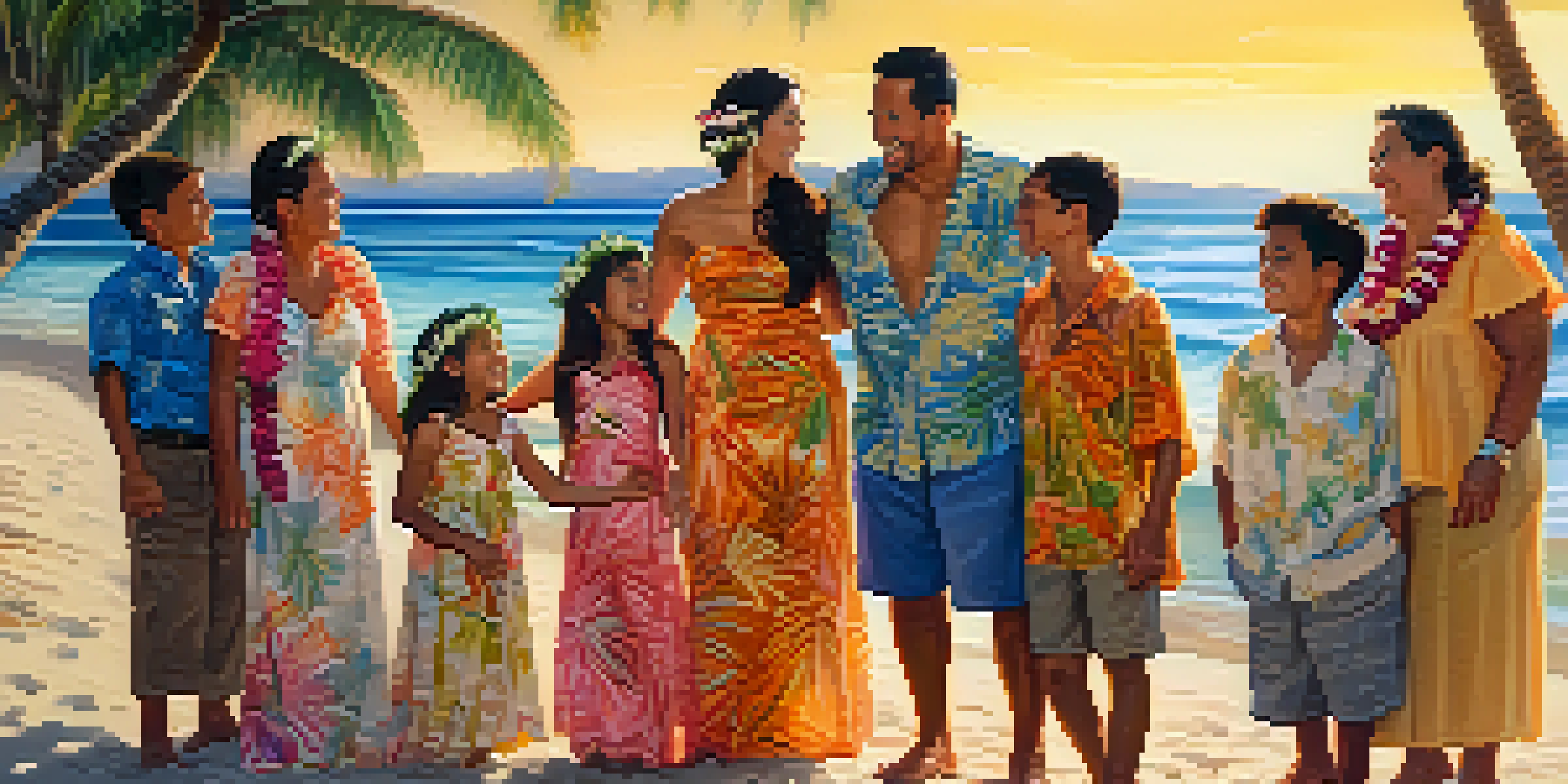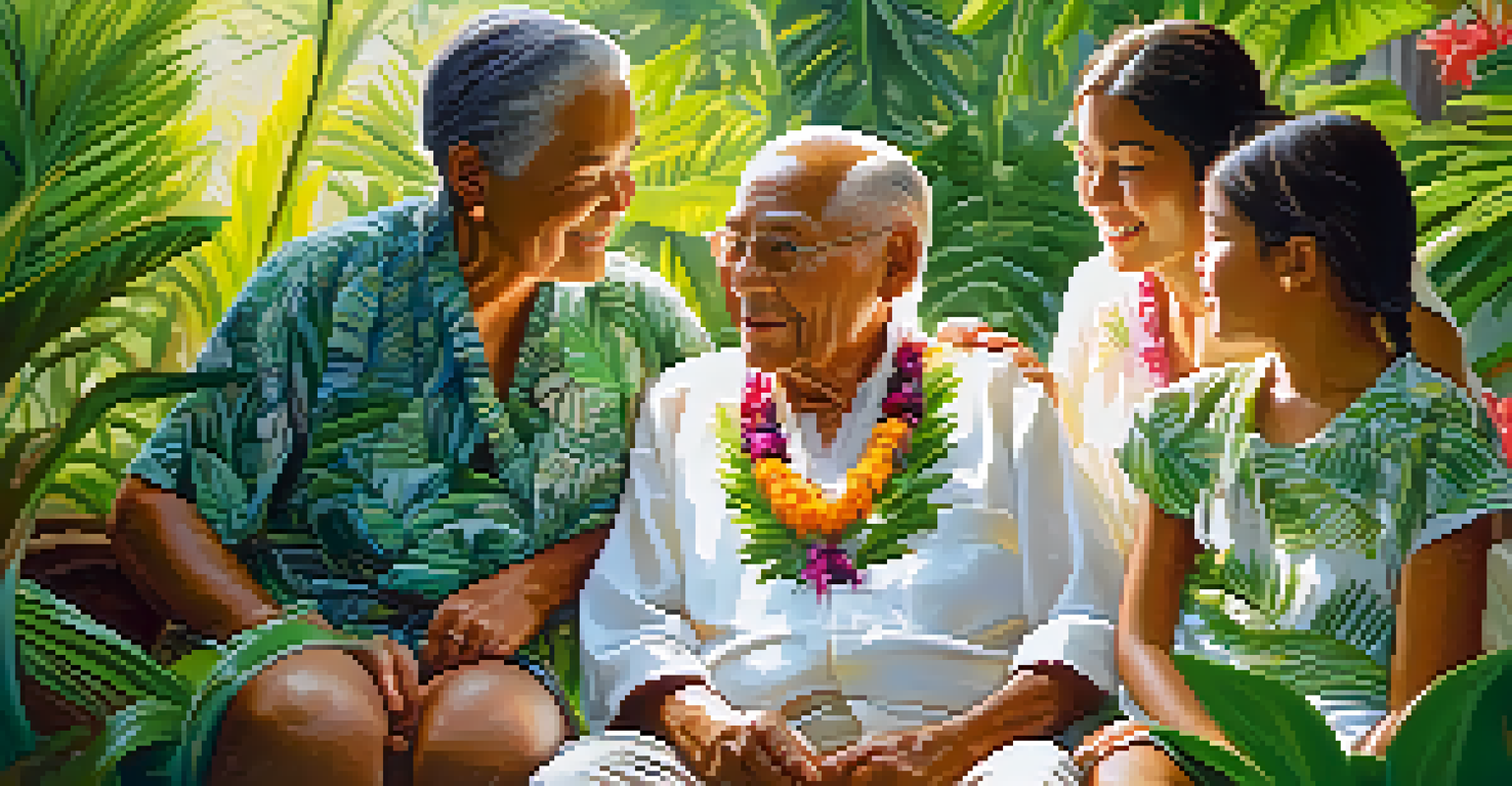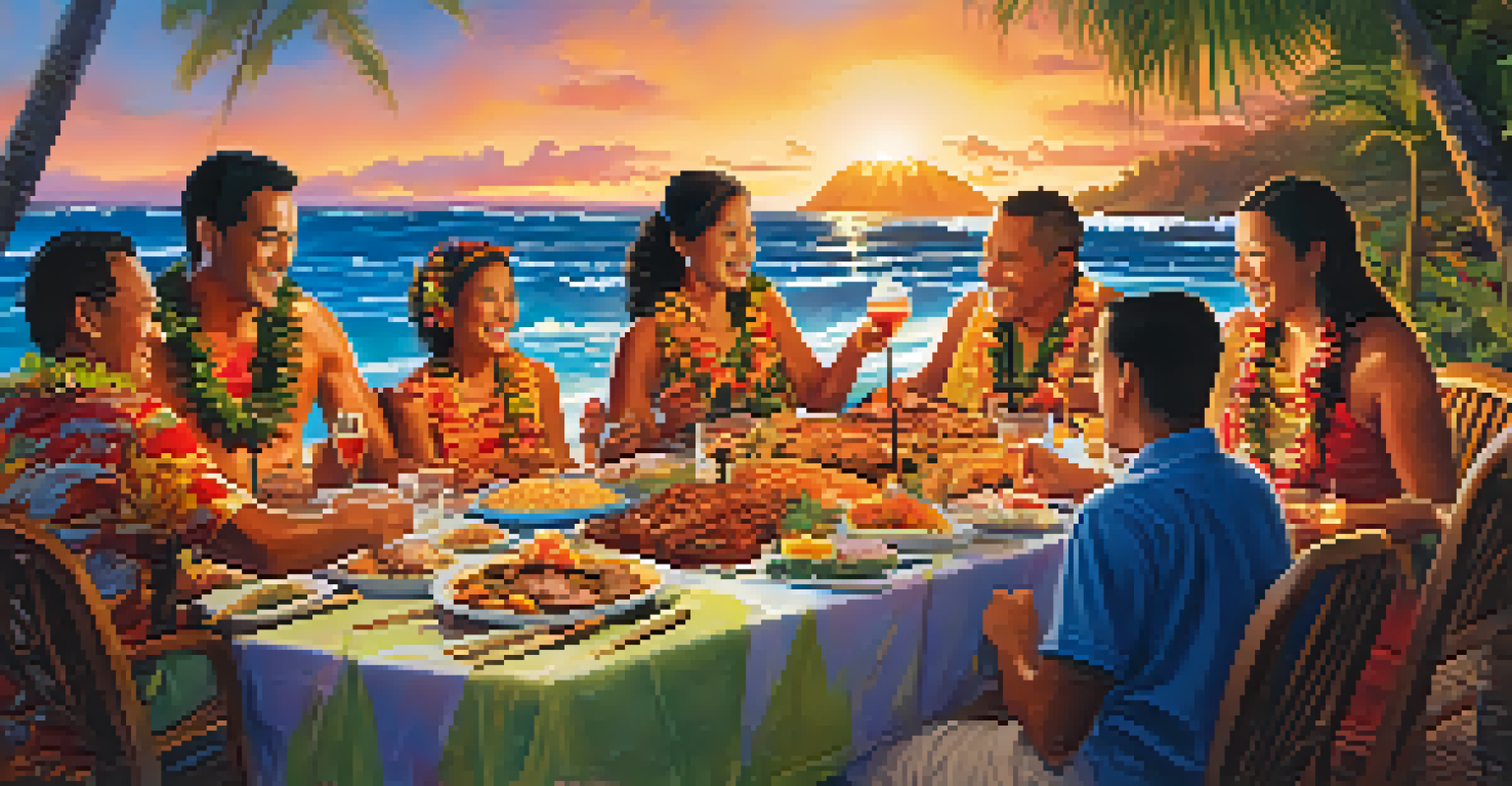Understanding Hawaiian Family Structures and Their Significance

Exploring the Basics of Hawaiian Family Structures
Hawaiian family structures are deeply rooted in cultural traditions and values. Unlike many Western societies, where the nuclear family often takes precedence, Hawaiian families typically emphasize extended family relationships. This interconnectedness reflects the belief that family is not just a unit but a broader network that includes grandparents, cousins, and close friends, creating a strong support system.
Family is not an important thing, it's everything.
In Hawaiian culture, the term 'ohana' represents this concept of family, which translates to 'family' in English but encompasses more than just blood relatives. It includes friends and community members who play a vital role in each other's lives. This idea of 'ohana' illustrates how Hawaiian families prioritize collective well-being over individualism, fostering a sense of belonging.
The significance of these structures is evident in various life events, from celebrations to challenges, where the extended family gathers to support one another. This support network is crucial during times of joy and sorrow, showcasing the resilience and strength found within Hawaiian family ties.
The Role of Culture in Shaping Family Dynamics
Culture plays a pivotal role in shaping Hawaiian family dynamics, influencing everything from child-rearing practices to decision-making processes. Traditional values, such as respect for elders and communal living, guide the interactions within families. These values are often passed down through generations, ensuring that cultural heritage remains intact.

Children in Hawaiian families are raised with a strong emphasis on community involvement. They learn the importance of relationships and responsibilities from a young age, often participating in family gatherings and community events. This practice not only strengthens familial bonds but also fosters a sense of identity and belonging within the larger Hawaiian culture.
Importance of 'Ohana in Hawaii
Hawaiian family structures emphasize 'ohana, which includes extended family and friends, highlighting the importance of collective well-being.
Moreover, cultural practices such as storytelling and hula serve as tools for teaching family history and values. These traditions create a rich tapestry of shared experiences that reinforce the family's significance within the community, making culture an essential element of Hawaiian family life.
Understanding the Importance of Elders in Hawaiian Families
In Hawaiian family structures, elders hold a position of great respect and authority. Known as 'kupuna,' these older family members are seen as the keepers of wisdom, tradition, and culture. Their experiences and knowledge play a crucial role in guiding younger generations, ensuring the continuity of cultural practices.
The family is one of nature's masterpieces.
The relationship between elders and younger family members is reciprocal; while the young learn from their elders, they also provide companionship and support. This mutual exchange strengthens family bonds and fosters a deep sense of gratitude and respect across generations. Events such as family gatherings often revolve around honoring and celebrating the kupuna.
By valuing the contributions of elders, Hawaiian families create a sense of stability and continuity. This respect for age and experience not only enhances family dynamics but also reinforces the community's collective identity, reminding everyone of the rich history and traditions that shape their lives.
The Impact of Modernization on Family Structures
Like many cultures around the world, Hawaiian family structures have been influenced by modernization. Urbanization, migration, and the adoption of Western lifestyles have led to shifts in traditional family dynamics. Many families now find themselves navigating between maintaining cultural practices and adapting to contemporary society.
This transition can create challenges, such as balancing work commitments with family obligations. Younger generations may face pressure to conform to modern norms, potentially distancing themselves from traditional values. However, many families strive to integrate both worlds, finding ways to honor their heritage while embracing new opportunities.
Role of Elders in Families
Elders, or 'kupuna,' are respected figures in Hawaiian families, guiding younger generations while fostering intergenerational bonds.
Despite these challenges, many Hawaiian families continue to prioritize the importance of 'ohana. Efforts to reconnect with cultural practices, such as participating in community events and learning the Hawaiian language, showcase a resilience and commitment to preserving family ties in a rapidly changing world.
The Influence of Religion on Hawaiian Family Life
Religion plays a significant role in Hawaiian family life, with spiritual beliefs often intertwined with daily practices. Many Hawaiian families identify with Christianity, while others uphold traditional Hawaiian spirituality, which emphasizes a deep connection with nature and ancestors. This blend of beliefs enriches family interactions and shapes their values and traditions.
Family gatherings often include prayers, blessings, and rituals that honor both family members and the environment. These practices foster a sense of unity and purpose, reinforcing the spiritual dimension of family life. Celebrating significant events, such as weddings and funerals, often involves religious ceremonies that reflect the family's beliefs.
By incorporating spirituality into family life, Hawaiian families create a deeper understanding of their place in the world. This connection to faith not only strengthens family bonds but also emphasizes the importance of community and the shared values that guide their lives.
Challenges Faced by Hawaiian Families Today
Despite the strong foundations of Hawaiian family structures, many families face challenges in today's fast-paced world. Issues such as economic pressures, housing shortages, and the high cost of living can strain familial relationships. Families often have to adapt quickly, navigating these obstacles while trying to maintain their cultural identity.
Moreover, the influx of tourism and development can disrupt traditional ways of living. Families may find it difficult to hold on to their land and cultural heritage when faced with external pressures. This struggle can create a sense of loss and disconnection, prompting families to seek ways to preserve their traditions.
Modern Challenges for Families
Hawaiian families face modern challenges such as economic pressures and cultural preservation, yet they demonstrate resilience by adapting while maintaining their heritage.
Yet, these challenges also inspire resilience within Hawaiian families. Many are actively engaging in community initiatives aimed at protecting their cultural heritage and advocating for social change. By coming together, families can tackle these issues while strengthening their bonds and ensuring the survival of their traditions.
Embracing the Future of Hawaiian Family Structures
As Hawaiian families look to the future, there is a growing recognition of the importance of adaptation while maintaining cultural integrity. Many families are embracing innovative approaches to family life that blend traditional values with modern conveniences. This balance allows them to honor their heritage while navigating contemporary challenges.
Younger generations are increasingly taking an active role in preserving and revitalizing cultural practices. By utilizing technology and social media, they share their experiences, stories, and traditions with a broader audience. This engagement not only strengthens family ties but also fosters a sense of pride in their identity.

Ultimately, the future of Hawaiian family structures is bright, rooted in the resilient spirit of 'ohana. As families continue to cherish their connections, they will undoubtedly find ways to thrive in an ever-changing world, ensuring that their traditions and values endure for generations to come.